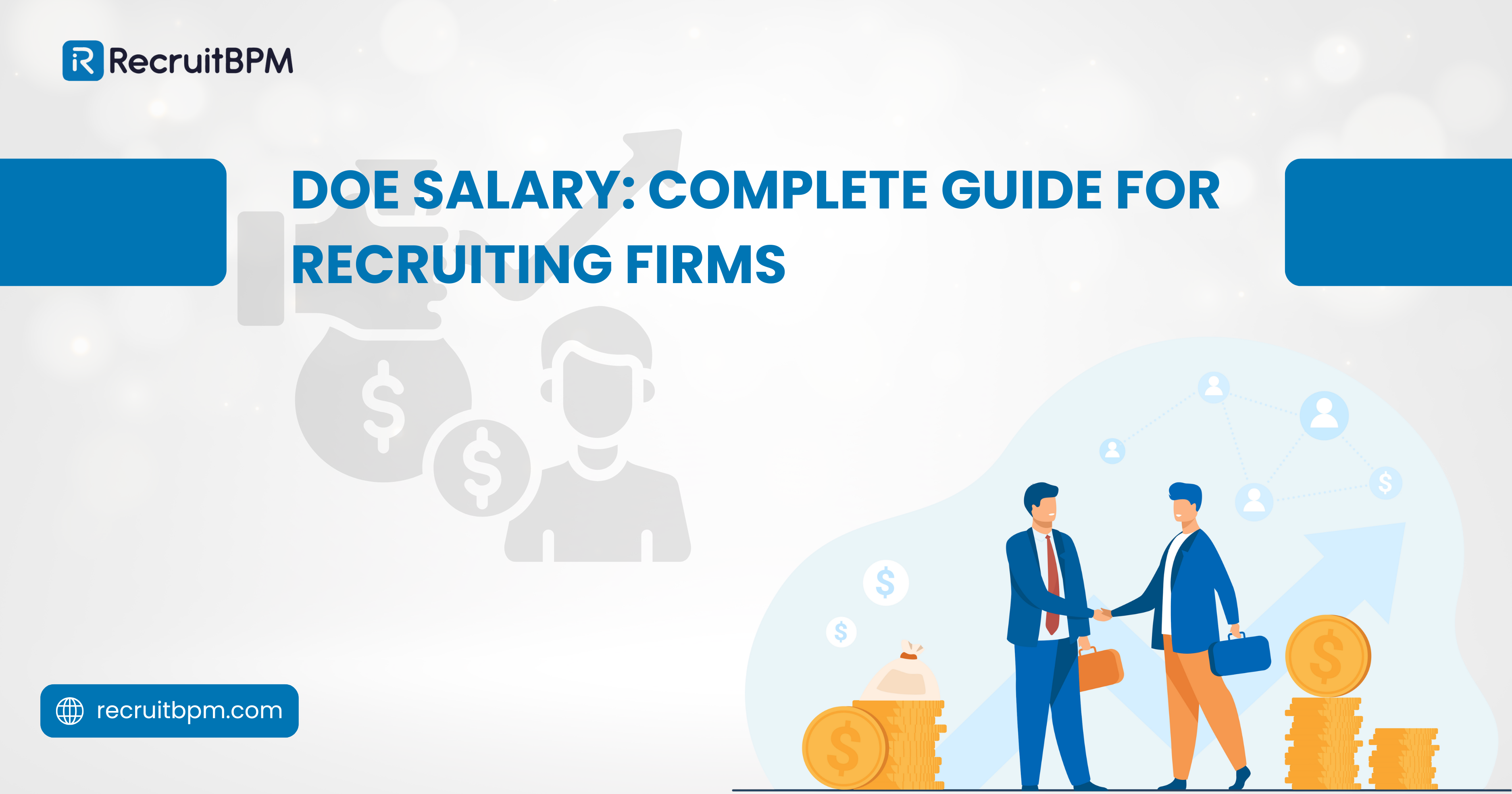Salary transparency shapes modern talent acquisition. Yet many recruiting firms still use “DOE” in their job postings. Understanding this compensation approach helps you attract top candidates while managing budget constraints effectively.
This guide explores what DOE means for staffing agencies. You’ll discover how to implement it successfully. We’ll show you how recruitment software streamlines the entire process.
What Does DOE Mean in Recruitment?
DOE stands for “Depending on Experience.” This term appears in job postings when salary isn’t predetermined. Instead, compensation gets determined during the hiring process based on candidate qualifications.
The approach differs from fixed salary listings. Employers maintain flexibility throughout recruitment. Candidates with more experience typically negotiate higher compensation packages.
Understanding “Depending on Experience” Terminology
When you see DOE in job descriptions, it signals flexibility. The employer values experience and adjusts pay accordingly. This creates room for negotiation between both parties.
Variable pay scales become possible with this approach. Your staffing agency can offer different amounts within a predetermined range. The candidate’s background directly influences the final offer.
This terminology encourages diverse applicants to apply. Entry-level candidates know they won’t compete against senior professionals for identical pay. Experienced professionals see opportunities to leverage their expertise.
DOE vs DOQ: Key Differences for Recruiters
DOE focuses specifically on work experience and professional history. DOQ means “Depending on Qualifications” and takes a broader view. The distinction matters when crafting job postings.
DOQ considers education, certifications, and specialized training. A candidate with an advanced degree might command higher pay under DOQ. Even without extensive work history, their qualifications carry weight.
Most recruiting firms prefer DOE for practical roles. Technical positions often benefit from DOQ language. Healthcare and IT sectors commonly blend both approaches together.
Your choice depends on what matters most. If hands-on experience drives success, use DOE. When credentials and certifications matter equally, DOQ makes sense.
When Staffing Agencies Use DOE Pay?
Staffing agencies implement DOE for multiple client placements. Each client organization has different budget constraints. DOE allows you to match candidates appropriately across varied opportunities.
High-volume recruiting scenarios benefit from this flexibility. You can quickly assess multiple candidates at different experience levels. Salary discussions happen after the initial screening is complete.
Specialized roles frequently use DOE compensation structures. Executive search firms rely on this approach extensively. The candidate’s track record directly correlates with earning potential.
Temporary and contract positions also utilize DOE frequently. Assignment duration and complexity influence final rates. Your agency maintains competitive positioning across diverse placements.
Why Recruiting Firms Use DOE Compensation?
The recruiting industry faces unique challenges with salary transparency. Client budgets vary widely across similar positions. DOE gives your agency the flexibility needed to serve diverse clients.
Modern candidates expect personalized compensation packages. Generic salary ranges don’t reflect individual value propositions. DOE enables tailored negotiations that recognize unique contributions.
Attracting Diverse Candidate Pools
Fixed salary ranges often discourage qualified applicants. Some candidates assume they’re overqualified for the stated amount. Others worry they lack the experience for higher compensation.
DOE removes these psychological barriers completely. Candidates at various career stages feel comfortable applying. Your talent pool expands significantly with this approach.
Passive candidates respond better to DOE listings. They’re willing to explore opportunities without fixed expectations. This increases your reach to top performers currently employed elsewhere.
Geographic flexibility improves with DOE compensation structures. Candidates in different markets have varying salary expectations. You can adjust offers based on regional considerations.
Flexibility in Budget Management
Client budgets change throughout extended recruitment engagements. DOE allows you to adapt without republishing positions. Your staffing agency maintains consistency while accommodating financial realities.
Multiple openings for similar roles become easier to manage. Each client might offer different compensation for identical positions. DOE prevents confusion while maintaining professional presentation standards.
Rush placements benefit from this flexible approach. When clients need immediate hires, you can negotiate quickly. Fixed ranges might exclude perfect candidates over minor differences.
Long-term contract negotiations happen more smoothly with DOE. You can adjust compensation as the project scope evolves. This flexibility strengthens client relationships and candidate satisfaction.
Negotiation Power for Agency Recruiters
Experienced recruiters use DOE to create win-win scenarios. You gather complete information about candidates before discussing numbers. This intelligence informs more strategic compensation conversations.
Candidates often reveal their expectations during initial discussions. You can gauge fit before making formal offers. This reduces wasted time on misaligned opportunities.
Your agency can reward exceptional candidates who exceed requirements. DOE makes it easier to present compelling offers. Top talent receives appropriate recognition for outstanding qualifications.
Multiple offer situations become more manageable with DOE. You maintain competitive positioning without showing your hand early. Strategic disclosure of compensation information strengthens negotiation outcomes.
Challenges of DOE Pay for Staffing Agencies
DOE compensation creates significant hurdles despite its benefits. Modern job seekers increasingly demand salary transparency. Your agency must balance flexibility with candidate expectations.
Regulatory landscapes shift toward mandatory pay disclosure. Several states now require salary ranges in postings. DOE-only approaches may violate these emerging requirements.
Transparency Issues in Modern Recruitment
Today’s candidates research extensively before applying. They use salary comparison websites and professional networks. DOE listings appear suspicious to informed job seekers.
Glassdoor reports that 82% of workers prefer transparent salary information. Your agency risks losing quality candidates to competitors. Those who provide clear compensation data attract more applicants.
Generation Z and Millennial workers especially value transparency. They view unclear salary information as a potential red flag. Building trust becomes harder when compensation remains vague.
Employer branding suffers from overly secretive compensation practices. Candidates share experiences on social media platforms. Negative perceptions spread quickly through professional communities.
Extended Negotiation Timelines
DOE increases the time spent on salary discussions. Each candidate requires individual compensation conversations. Your team invests more hours per placement when using this approach.
Some candidates prove inflexible during negotiations despite DOE listings. They arrive with firm salary requirements that may exceed budgets. Time gets wasted when expectations don’t align early.
Multiple negotiation rounds become common with DOE positions. Candidates often counter initial offers, expecting further discussion. Your recruitment cycle extends compared to transparent salary approaches.
Client approval processes lengthen when offers vary significantly. Finance departments scrutinize individualized compensation packages more closely. Administrative overhead increases across the placement lifecycle.
Pay Equity and Compliance Risks
DOE creates potential for inconsistent compensation decisions. Unconscious bias influences negotiation outcomes more easily. Similar candidates might receive different offers without objective justification.
Legal compliance becomes more complex with DOE structures. Equal pay laws require demonstrable justification for wage differences. Your agency needs robust documentation to support varied compensation.
Historical pay disparities affect certain demographic groups disproportionately. Women and minorities often negotiate less aggressively than their counterparts. DOE can perpetuate existing inequities without careful management.
OFCCP and EEOC scrutiny increases around compensation practices. Federal contractors face particularly strict requirements for pay equity. Your documentation must demonstrate fair, consistent decision-making processes.
How to Determine Fair DOE Salary Ranges?
Successful DOE implementation requires thorough market research. You need clear frameworks for translating experience into compensation. Systematic approaches prevent inconsistency and ensure fairness.
Data-driven methodologies support defensible compensation decisions. Your recruiting firm should establish clear benchmarks and guidelines. Candidates deserve transparent explanations for offered amounts.
Market Research and Salary Benchmarking
The Bureau of Labor Statistics provides foundational salary data. Use their Occupational Employment Statistics for regional information. This government source offers credible baseline information free of charge.
Commercial salary surveys provide more granular industry insights. PayScale, Salary.com, and Glassdoor offer detailed compensation intelligence. Subscription services give you competitive advantages in negotiations.
Professional associations publish annual compensation reports regularly. These industry-specific resources reflect current market conditions. Network with peers to validate your benchmark assumptions.
LinkedIn Salary and Indeed Salary tools provide real-time data. Candidates use these same resources during their research. Familiarize yourself with information they’ll likely reference.
Creating Compensation Bands by Experience Level
Establish clear experience tiers for common positions. Entry-level, mid-level, and senior categories provide starting frameworks. Define each tier with specific year ranges and competency expectations.
Assign salary ranges to each experience category systematically. Junior positions might span 0-3 years with corresponding pay bands. Senior roles could cover 8+ years with substantially higher ranges.
Overlap between tiers allows for exceptional junior candidates. Someone with 2 years but extraordinary accomplishments deserves mid-level consideration. Flexibility within structure prevents losing outstanding talent.
Document the criteria that justify placement in each tier. Skills mastery, leadership experience, and specialized certifications matter. Clear guidelines ensure consistent application across different recruiters.
Industry-Specific DOE Guidelines
Technology sector compensation changes rapidly with market conditions. Software developers command premium rates during talent shortages. Your agency must update benchmarks quarterly in fast-moving industries.
Healthcare staffing requires specialized license and certification considerations. Registered nurses with specific specialty certifications earn significantly more. DOE structures must account for these credential premiums.
Executive search operates with dramatically different compensation models. Senior leadership roles justify extensive experience-based salary variation. Your framework for executives differs substantially from operational positions.
Contract and temporary placements follow distinct compensation patterns. Hourly rates vary based on assignment duration and complexity. Bill rates to clients must factor in experience levels appropriately.
Best Practices for Negotiating DOE Salaries
Effective negotiation requires preparation and clear communication. Your recruiters need training on salary discussion techniques. Consistent approaches across your team prevent problematic variations.
Candidates appreciate transparency even within DOE frameworks. Share your decision-making process and evaluation criteria. This builds trust and facilitates smoother negotiations.
Pre-Interview Preparation Steps
Research candidate backgrounds thoroughly before initial conversations. Review their LinkedIn profiles and professional accomplishments. Understanding their trajectory informs realistic compensation expectations.
Identify comparable placements your agency has made recently. What did similar candidates receive for related positions? Internal consistency matters as much as external benchmarks.
Prepare a salary range before beginning candidate discussions. Know your absolute maximum and preferred target amounts. Having clear parameters prevents improvisation during negotiations.
Coordinate with clients about budget flexibility before interviews. Understand their willingness to exceed initial ranges for exceptional candidates. This intelligence strengthens your negotiating position with talent.
Candidate Communication Strategies
Address compensation expectations during initial screening calls. Ask candidates about their requirements before investing substantial time. This early alignment saves effort on both sides.
Explain how your agency determines DOE compensation clearly. Describe the factors that influence final offers transparently. Candidates appreciate understanding the evaluation framework in advance.
Frame salary discussions around value creation, not just experience. Help candidates articulate their unique contributions and achievements. This positions compensation as investment in future results.
Avoid premature commitment to specific numbers during early conversations. Express ranges or frameworks rather than precise amounts. Maintain negotiating flexibility while providing helpful guidance.
Documentation and Agreement Protocols
Create written offer letters that detail all compensation components. Include base salary, benefits, bonuses, and any special provisions. Comprehensive documentation prevents misunderstandings after acceptance.
Maintain detailed records of salary negotiation rationale. Document the experience factors that justified the final amounts. This information becomes critical for pay equity audits.
Establish approval workflows for compensation above normal ranges. Senior leadership should review exceptional offers before presentation. Consistency across your organization protects against discrimination claims.
Follow up offer acceptances with formal employment agreements. Include all terms discussed during negotiations explicitly. Legal clarity protects your agency, client, and candidate.
Managing DOE Pay with Recruitment Software
Modern ATS platforms transform DOE salary management completely. Technology brings consistency to compensation decision-making. Your recruiting firm gains efficiency while improving documentation.
Recruitment CRM systems track salary negotiations across multiple candidates. Historical data informs future compensation strategies. Analytics reveal patterns that optimize your approach over time.
Tracking Salary Ranges in Your ATS
Configure your applicant tracking system with compensation fields. Include current salary, expectations, and final offer amounts. Structured data enables better analysis than scattered notes.
Tag candidates with experience level classifications automatically. Your ATS should categorize junior, mid-level, and senior candidates. This standardization supports consistent compensation approaches.
Create salary range templates for common positions. Store approved compensation bands within your recruitment platform. Recruiters access approved ranges without hunting through files.
Link compensation data to candidate sources and demographics. Track whether salary offers vary by referral channel. This visibility helps identify potential equity issues early.
Automating Compensation Communication
Email templates streamline salary discussion consistency across recruiters. Create approved language for various negotiation scenarios. Your team maintains professionalism while saving time.
Automated reminders prompt necessary compensation approvals. When offers exceed thresholds, notifications go to the appropriate stakeholders. Nothing falls through cracks during busy hiring periods.
Integration with offer letter generation accelerates placement closings. Approved compensation flows directly into formal documents. Manual data entry errors disappear with systematic workflows.
Candidate portals provide transparency about next steps. Applicants see where they stand in evaluation processes. This reduces anxiety and improves overall candidate experience.
How RecruitBPM Streamlines DOE Management?
RecruitBPM offers comprehensive salary management within your ATS. Custom fields capture all relevant compensation information systematically. Your team accesses everything needed for informed negotiations.
Workflow automation ensures consistent approval processes for all offers. Configure rules that route exceptional compensation for leadership review. Compliance becomes automatic rather than manual oversight.
Reporting dashboards reveal compensation trends across your placements. Identify patterns in successful negotiations versus lost candidates. Data-driven insights continuously improve your approach.
AI-powered recommendations suggest appropriate salary ranges for candidates. The system learns from historical placements and outcomes. Your recruiters make better initial offers with intelligent assistance.
Legal Compliance and DOE Pay
Regulatory requirements around salary transparency continue evolving rapidly. Your recruiting firm must stay current with changing laws. Non-compliance carries significant financial and reputational risks.
Multiple jurisdictions now mandate salary disclosure in postings. California, New York, Washington, and Colorado lead transparency movements. More states introduce similar legislation each year.
Pay Transparency Laws by State
New York City requires salary ranges in all job advertisements. The law applies to positions performed in the city. Violations result in fines and potential legal action.
California’s pay transparency law took effect in January 2023. Employers with 15+ employees must disclose compensation ranges. Remote positions available to California residents fall under this requirement.
Washington State mandates salary disclosure in all job postings. The law covers employers with 15+ employees statewide. Recruitment agencies must comply when posting client positions.
Colorado pioneered comprehensive pay transparency requirements in 2021. All job postings must include compensation and benefits information. Remote positions must specify if Colorado residents can apply.
EEOC and OFCCP Compliance Requirements
The Equal Employment Opportunity Commission scrutinizes compensation practices closely. Disparate impact in salary outcomes triggers investigations. Your agency needs documented justification for pay differences.
Federal contractors face additional Office of Federal Contract Compliance oversight. Annual compensation analysis becomes mandatory above certain thresholds. Proactive pay equity assessments reduce compliance risks.
Job-related justification must support all compensation variations. Experience alone may not sufficiently explain significant differences. Skills, education, and performance must factor into decisions.
Maintain at least three years of compensation decision documentation. Include candidate qualifications, market data, and approval records. Complete files demonstrate good faith compliance efforts.
Avoiding Discrimination in DOE Offers
Train recruiters on unconscious bias in salary negotiations. Women and minorities often receive lower initial offers. Awareness and structured processes combat these problematic patterns.
Use standardized evaluation criteria for all candidates consistently. Create scoring rubrics that translate experience into compensation objectively. Reduce subjective judgment wherever possible in decisions.
Review compensation decisions for disparate impact patterns regularly. Analyze offers by gender, race, and other protected characteristics. Address concerns about trends before they become systemic problems.
Consider banning salary history questions in initial screenings. Many states prohibit this practice to prevent perpetuating inequities. Focus discussions on candidate expectations and market rates instead.
DOE Salary Examples Across Industries
Compensation approaches vary dramatically by sector and role type. Understanding industry-specific patterns improves your recruitment effectiveness. Real-world examples illustrate best practices in action.
Different positions require tailored DOE implementation strategies. What works for technology differs from healthcare approaches. Customize your methodology to fit specific market dynamics.
Technology and IT Recruitment
Software developers command wide salary ranges based on experience. A junior developer might earn $70,000-$85,000 annually. Senior engineers with 8+ years easily reach $130,000-$180,000.
Specialized skills like machine learning or cybersecurity justify premiums. Candidates with sought-after expertise negotiate significantly above baseline. Your DOE approach must accommodate these market realities.
Remote work arrangements affect compensation expectations substantially. Geographic flexibility changes traditional salary calculation methods. Candidates expect pay reflective of the role value, not location.
Equity compensation often supplements base salary in tech. Stock options or RSUs become critical negotiation components. Your agency must understand these total compensation packages thoroughly.
Healthcare Staffing Scenarios
Registered nurses demonstrate clear experience-based compensation tiers. New graduates typically start around $60,000-$70,000 annually. Nurses with 10+ years in specialty areas earn $90,000-$110,000.
Certifications significantly impact healthcare professionals’ compensation. Critical care or emergency department specializations command premium rates. DOE structures must account for credential combinations specifically.
Travel nursing assignments follow different compensation models entirely. Premium rates compensate for temporary placement challenges. Your agency needs separate frameworks for permanent versus travel roles.
Physician recruitment involves extremely wide DOE ranges. Specialty, geographic market, and practice setting dramatically affect compensation. Executive-level negotiation skills become essential for these placements.
Executive Search Compensation
C-suite positions justify extensive compensation variation based on experience. CEO salaries might range from $200,000 to several million. Prior company size and industry success strongly influence offers.
Bonus structures and equity become primary negotiation focus. Base salary often represents smaller portions of total compensation. Your executive search team must expertly navigate complex packages.
Board experience and industry reputation command significant premiums. Executives with proven transformation track records deserve premium compensation. DOE implementation requires sophisticated market intelligence at this level.
Non-compete agreements and golden parachutes affect executive negotiations. Complex legal considerations intersect with pure compensation discussions. Partner with specialized legal counsel for executive placements.
Conclusion
DOE compensation offers recruiting firms valuable flexibility when implemented thoughtfully. You can attract diverse candidates while managing varied client budgets. Success requires systematic approaches backed by solid market research.
Modern compliance requirements demand greater transparency than traditional DOE approaches. Balance flexibility with candidate expectations for optimal results. Technology platforms like RecruitBPM make this balance achievable.
Your recruiting firm needs clear policies and consistent execution. Train your team thoroughly on negotiation best practices. Document decisions comprehensively to demonstrate fairness and compliance.
Ready to streamline your DOE salary management? RecruitBPM’s integrated ATS and CRM platform provides the tools you need. Automate workflows, maintain compliance, and close placements faster. Schedule a demo today to see how we simplify compensation management.

















